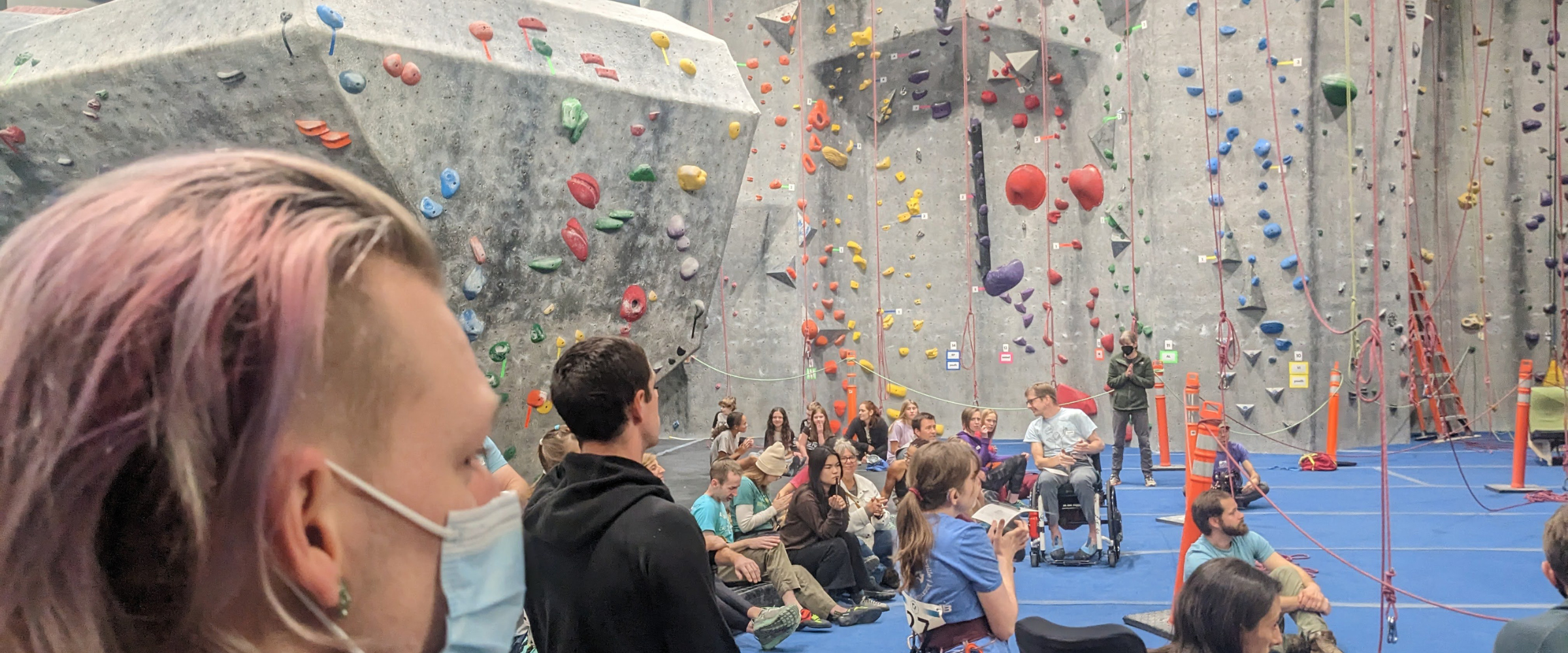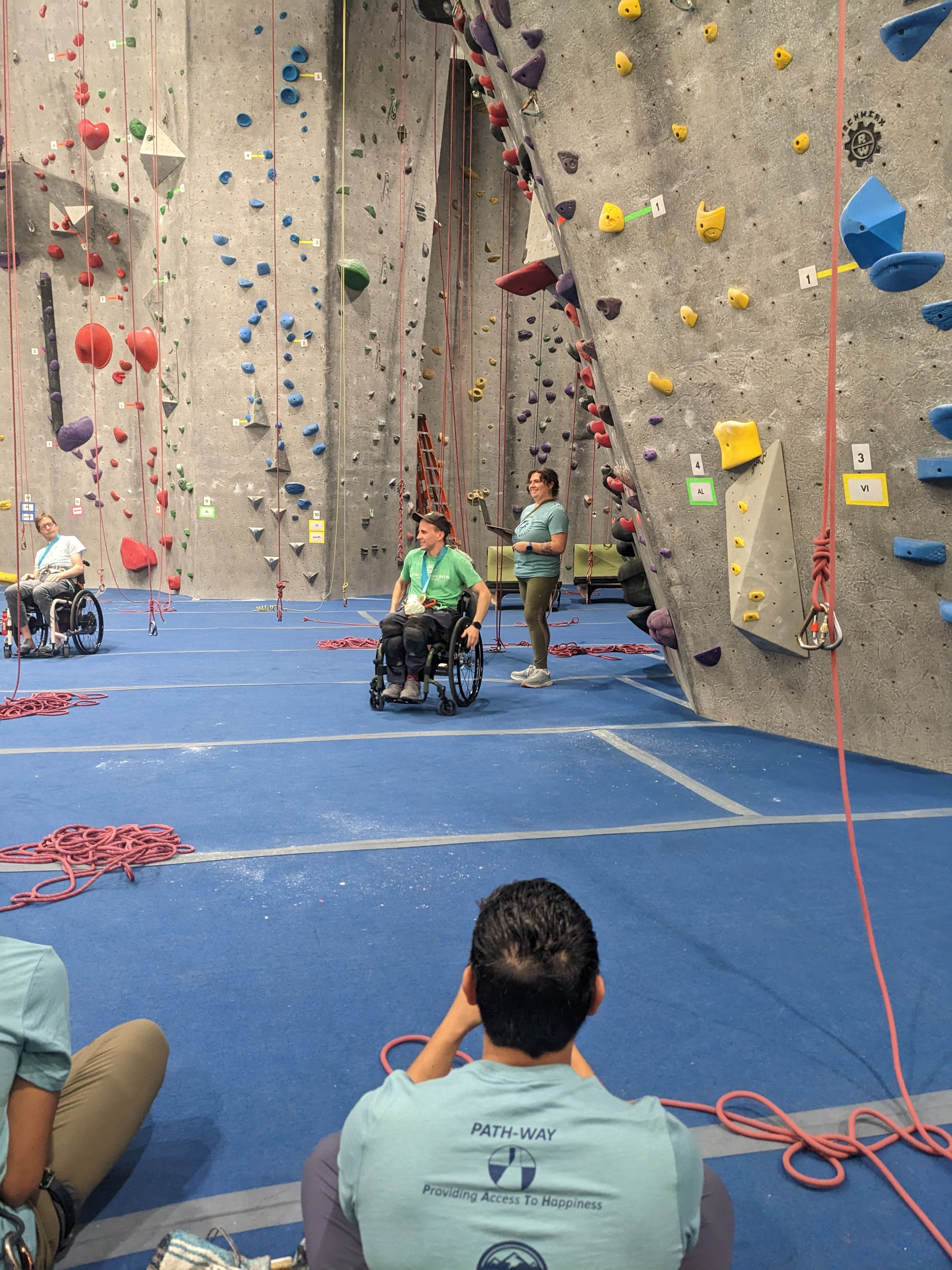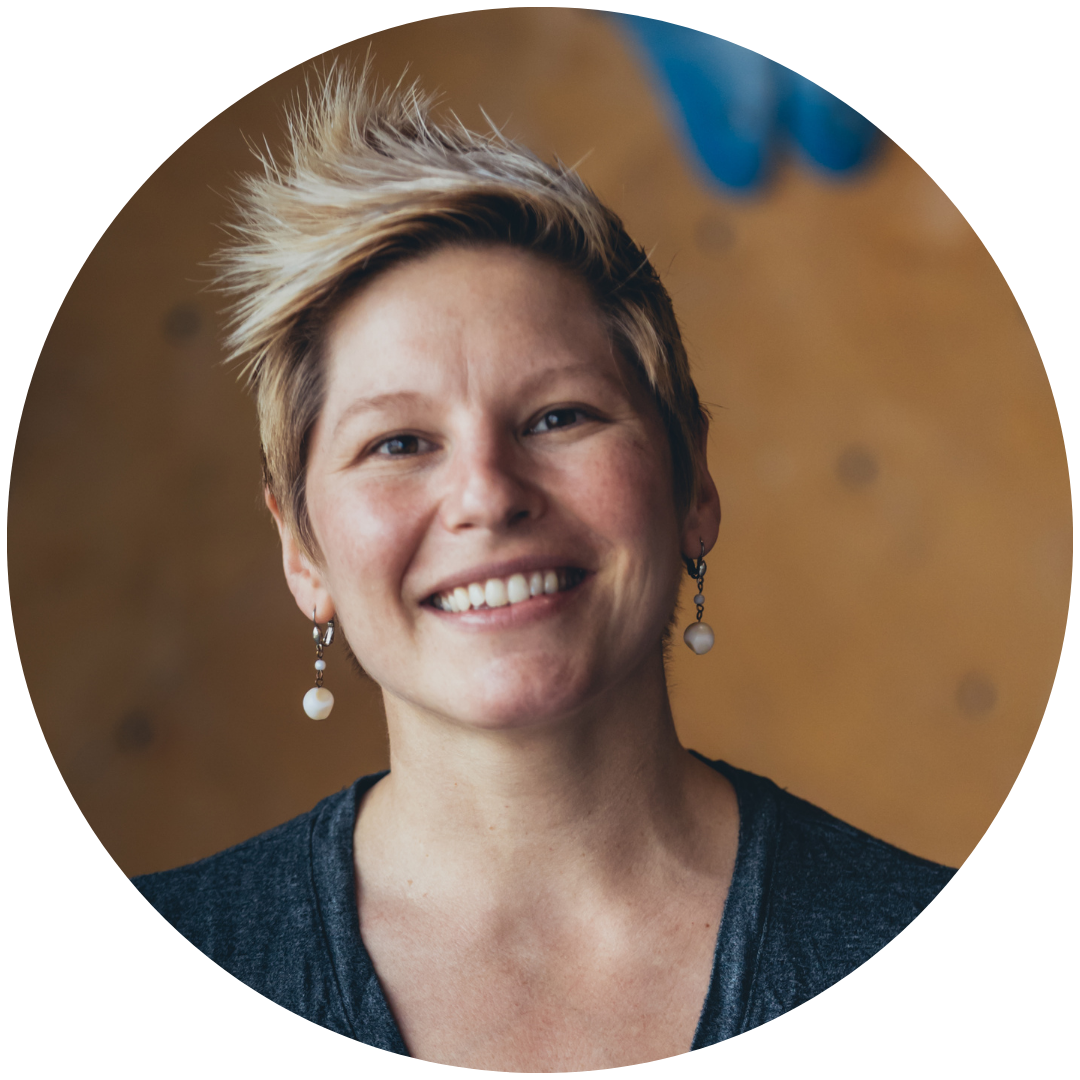How To Host a Recreational Paraclimbing Competition

For the first time in history, the 2023 USA Climbing National Team Trials and Paraclimbing National Championship will be held together. The Paraclimbing Nationals is the sole selection event for the Paraclimbing series and top athletes will represent the U.S. at the Paraclimbing World Cup
I recall my interview with National Paracompetitor, Ben Hickson, from Team Catalyst. Nationals was the first competition he ever attended. He was excited but felt unprepared despite his regimented training. Ben attended Nationals, qualified, and was invited to compete at Worlds in Salt Lake City last year! However, due to a lack of experience and intimidation, he declined to go.
I wondered, could my home gym, The Crag Nashville, host a recreational Paraclimbing competition to better prepare our athletes for the national stage.
When I brought the idea to my routesetting team I was met with concerns because they were inexperienced in routesetting for a Paracompetition. There are multiple categories and considerations for each.
The categories are seated, reduced power, upper body amputee, lower body amputee, visually impaired, and youth. I began talking with Eric Gray, the president of Catalyst Adaptive Sports about the details for hosting a recreational Paraclimbing competition. Eric told me about an upcoming recreational Paraclimbing competition at Highpoint Riverside, in Chattanooga, Tennessee, and so I headed out to investigate.
With determination and excitement, I drove east into the silver sunrise through the dewy fields, over Mount Eagle, to Highpoint Riverside with my Programs Assistant, Jonathan Wilson to volunteer for the event.
When we arrived, we were met with smiling faces, t-shirts, and name tags. From start to finish, the event was beautifully organized. There were two hours for check-ins, belay checks, rules, and questions. The gym was bustling with excitement, there were 27 competitors and 27 volunteers. There were three top rope routes in each category, all of which had five zones. Over three hours, competitors each had ten attempts. Witnesses were asked to write the zone reached at each attempt. Two volunteers were assigned near each route so two witnesses could initial scorecards. I saw some seriously strong competitors, including Ben Hickson, the National finalist, out for a little more competitive experience.
READ ALSO: Is Adaptive Climbing Part Of Your Gym Culture?
Afterward, I reached out to the organizers to review how they orchestrated the event so others may learn from their experience and host their recreational Paraclimbing competition in the future.
Matthew Waits, General Manager of Highpoint Riverside
I spoke first with Matthew, the General Manager of Highpoint Riverside.
How long did it take to plan the Riverside event?
“From an operator perspective, planning started about five months in advance to give adequate time to get the word out to competitors. In reality, I only took about three Zoom calls to get everything squared away.”
Who took care of marketing and registration?
"Catalyst handled the registration and marketing, while we focused on using their material to market to our member base and those in our surrounding areas for both competitors and volunteers.
They are very well tied into the adaptive community throughout the country, which was a big help in getting competitors to travel to us. Catalyst also handled check-ins, prizes, awards, shirts, and snacks for the athletes/volunteers. Highpoint handled waiver checks and belay testing/instruction for volunteers.”
What was the budget?
“Catalyst covered the cost of our guest routesetters for the week. We donated the facility space, two in-house routesetters for the week, and a staff member to handle belay testing/instructing. That will be different for every operator, but we were able to remain open to the public during the climbing competition and only closed off the competing areas.”
If you were going to host another event, what would you change?
“Overall the event was amazing to host on our end! We went for more of a laid-back competition vibe as this was meant to be an introduction to competitive climbing for a large portion of the competitors.
The only thing I would change would be to either do it even bigger in the future with the same laid-back style of competing or go the other direction to try and mimic what competitors will experience at Nationals.
"Since adaptive athletes do not have a lot of comps to choose from, a closer style to Nationals may be beneficial in preparing for the big stage. Either way, it was a pleasure to give these athletes a space to compete we hope to be able to do a lot more in the future.”
Download A Paracompetition Scorecard
Designed by Eric Gray of Catalyst Adaptive Sports, this scorecard is used to judge and track progress throughout a competition.
Eric Gray, Catalyst Adaptive Sports
Next, I spoke with Eric, the president of Catalyst Adaptive Sports.
What did Catalyst take care of?
“From an organizational standpoint, we took care of every detail from promotion to hiring to executing the day of the event. We don't want to be a burden on the climbing gyms and make it financially feasible for the climbing gyms to get behind.”
If you were going to do it again, what would you change?
- Stronger belay checking/vetting process and reviewing the belay system before the competition
- Picking a climbing gym with more resources (jugs and volumes) to make setting easier
- More information on the application process so we have a better idea of who is coming for the routesetters
- I think the single most important piece is to have routesetters with adaptive setting experience who can set for all the different categories
Aaron Davis, Bloc Haven
I needed a routesetter’s perspective on the challenges and triumphs of the event and spoke with guest setter, Aaron, the head routesetter for Bloc Haven, Greeneville, SC.
What kind of preparation goes into this kind of event?
The biggest logistical planning from a routesetting perspective is working with the host facility to determine how much terrain you have, planning the layout of the routes in that given terrain, and determining your routesetting crew size. Then determine the time you would need to complete the routesetting, forerunning, and all other pre-comp preParation.”
What should climbing gyms know before attempting this kind of event?
“Quality adaptive routesetting takes resources and modifications to holds. Being OK with dedicating a large portion of jugs, macros, and volumes to your adaptive routesetting is important. Adding screw-ons to macros is a common practice that is generally necessary for certain categories. Most categories have more success on vert-low angle terrain so being able to afford to dedicate that terrain to your event is necessary.”
How do routesetters acquire this specific kind of experience?
“Right now, there's not a specific routesetting track within USAC but it is something that is being developed and in the works. To gain experience with adaptive routesetting, I'd recommend working with your climbing gym's adaptive program director to learn more about the impairments your community might have and how you can best create routes that make them more accessible for that adaptive community.
Climbing gyms could always reach out to the routesetters that set at the Paraclimbing nationals or seek facilities with large adaptive programs. I know other facilities have reached out to bring in higher-level Paraclimbing routesetters to teach a clinic for their in-house routesetters which is a great way to get a jump start on learning how to do it."
 |
|
Ben Hickson, Nationals Finalist, during the competition. Photo: Hailey Caissie |
"I would encourage all facilities to start building an adaptive climbing program. Climbing should be accessible to all and we can do better as an industry to be more inclusive to all communities.”
Embrace Paraclimbing and Grow
It can be intimidating to begin something new, but let’s start small with the resources we already have. Open the dialog between our existing Paraclimbers and routesetters about what considerations are needed for our existing categories of climbers. We will begin to understand what kind of setting is fun and encourage more climbers to try competitive challenges. Consider giving endurance challenges like the Paradox Mile at the beginning of summer to piggyback from the camp routesetting; both require jug hauls. We can mark zones on routes and challenge them to see how many laps they can complete in a month, week, or day.
Our routesetters will build experience for Paraclimbers as we open a dialog and create more opportunities for our Paraclimbing communities.
We can start with what we have and learn from each attempt. When we try, we learn. We guide the trends in our industry and can continue to grow our Paraclimbing communities by providing our climbers with the opportunities they need to grow.
Want to learn more about Paraclimbing and how to offer opportunities for this community at your gym?
Join us at the 2023 CWA Summit to hear from our keynote, Adaptive Climbing Group founder Kareemah Batts
About the Author
 Hailey Caissie is the Programs Manager at The Crag Climbing Gym in Nashville, Tennessee. Hailey has been a climbing instructor since 2006 and loves seeing new climbers discover their abilities. She finds it especially fulfilling to coach young athletes toward discovering their potential. She works to inspire generations of climbers to become more intentional, influential, and inclusive.
Hailey Caissie is the Programs Manager at The Crag Climbing Gym in Nashville, Tennessee. Hailey has been a climbing instructor since 2006 and loves seeing new climbers discover their abilities. She finds it especially fulfilling to coach young athletes toward discovering their potential. She works to inspire generations of climbers to become more intentional, influential, and inclusive.
